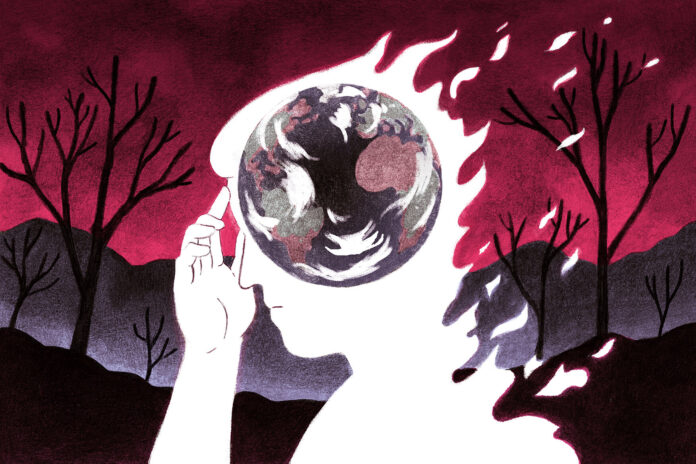“Losing his home was traumatic. But losing his bearings in his own neighborhood “scared the hell out of” him, Mr. Kochanowski remembered, and triggered new existential concerns about climate change.
“Now he agonizes over his 14-year-old daughter’s future. “What kind of a world will Ava grow up in?” he said. “Will Southern California be uninhabitable when she is my age?”
“Mr. Kochanowski’s sense of dread fits into an array of sentiments often called climate anxiety, a term that includes anger, worry and insecurity stemming from an awareness of a warming planet.
“Evidence that climate change threatens mental health is mounting, according to a recent report from Imperial College London’s Institute of Global Health Innovation. Higher temperatures are tied to depressive language and higher suicide rates. Fires, hurricanes and heat waves carry the risk of trauma and depression.
“Cascading climate-driven disasters have forced American Red Cross volunteers to stay in the field for months, rather than weeks, said Trevor Riggen, who runs the group’s domestic disaster programs. He noted that because of climate change, the Red Cross has been shifting from a focus on immediate trauma, “to this more chronic condition that needs a different type of mental health intervention, or spiritual care.”
“Young people especially report feeling debilitated by climate anxiety and being frustrated by older generations. “They try to understand, but they don’t,” said 16-year-old Adah Crandall, a climate and anti-freeway activist in Portland, Oregon. “I am scared for my future because of the inaction of adults in the past.”…
“Today, when the humidity drops, Mr. Kochanowski sees the anxiety on his neighbors’ faces. Hot days stretch across more of the year and dewy, cool mornings are rare. Sometimes, he wonders if they should move on.
“You realize the larger forces that have always been beyond your control,” he said. “That level of realization makes you feel a little helpless.”
“Andi Poland, 49, a technical recruiter who lives near Denver, said she too experiences anxiety, grief and dread about a hotter planet. “I am glad that I am short for this earth,” she said. “I figure I have one-third of my life left. I am not upset that I only have that much time,” (Peterson, 2021).
Climate anxiety is a real issue. After years of being fed shocking content and dire warnings, people feel they are losing control, like climate change is a hopeless battle to fight. This is especially present in young people who feel that their futures will be robbed by climate change. Many of us have been fighting for years, changing our behaviors, protesting, reading, learning, you name it. And yet climate change is still an issue that’s getting worse. It never seems to change.
So, how does this impact collaboration with ODNR? It gives insight into possible motivators. It shows ways I should not approach sustainability issues. It leads me to ask new questions… like how do we motivate people who feel hopeless? Can we show them that what they are doing does make an impact? Can we rewrite the narrative and bring them hope?
Can we reignite their passion and spark a new wave of action?
References
Maillard, A. (2021, July 23). [Climate anxiety]. New York Times.
https://www.nytimes.com/2021/07/23/well/mind/mental-health-climate-anxiety.html
Peterson, M. (2021, July 23). How to calm your climate anxiety. The New York
Times. Retrieved September 12, 2024, from https://www.nytimes.com/2021/07/
23/well/mind/mental-health-climate-anxiety.html




